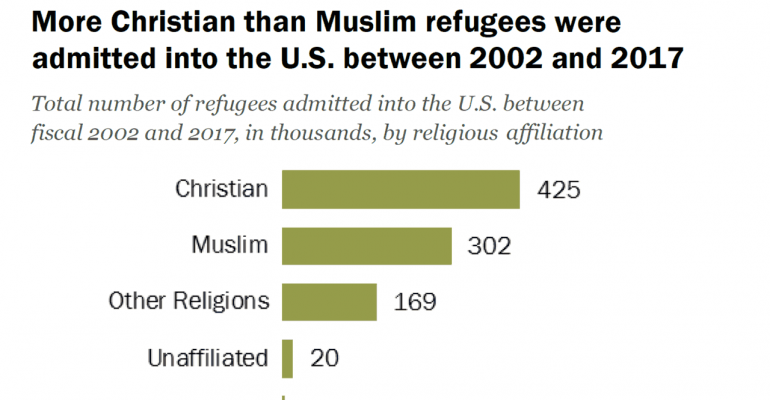Religious affiliation of U.S. refugees: Growing number of Muslims
October 17, 2017 2023-07-12 14:48Religious affiliation of U.S. refugees: Growing number of Muslims

Religious affiliation of U.S. refugees: Growing number of Muslims
The U.S. has resettled more refugees than any other country – about 3 million since 1980. Generally, in years when more people around the globe are displaced by conflict, violence or persecution in their countries, the number of refugees resettled by the U.S. has increased. But in the last few years, the number of refugees annually resettled by the U.S. has not consistently grown in step with a worldwide refugee population that has expanded nearly 50% since 2013, according to a Pew Research Center analysis of United Nations High Commissioner for Refugees (UNHCR) and U.S. State Department data.
Across the globe in 2016, there were about 17.2 million people displaced from their homes due to conflict or persecution across international borders, according to UNHCR. That is a new global high point that rivals the early 1990s, following the fall of the Berlin Wall. On average, between 1982 and 2016, the U.S. resettled about 0.6% of the globe’s total refugee population each year.
Each year, UNHCR identifies a portion of all officially recognized refugees as candidates for resettlement in the U.S. or other countries. In recent years, about 1 million individuals per year have been identified for resettlement. Of this number, only a fraction of refugees are typically resettled. In 2016, for example, out of approximately 1 million eligible refugees identified by UNHCR, an estimated 189,000 were resettled worldwide, with more than half (51%) of these ending up in the United States. Between 1982 and 2016, the U.S. admitted more than two-thirds (69%) of the world’s resettled refugees, followed by Canada (14%) and Australia (11%).
For several decades, the annual volume of U.S. refugee arrivals has generally waxed and waned with the world’s overall refugee population…
As nationalities of refugees have changed, so too have religious affiliations. Between fiscal 2011 and 2016, a rising number of refugees have been Muslim, reflecting the increasing number of refugees from Muslim-majority countries admitted to the United States. In 2016, a record number of Muslim refugees were admitted to the U.S.
At the same time, Christians continue to make up a large share of the refugees admitted to the United States. In fiscal 2017, for example, a plurality of refugee arrivals were Christian (47%), with Muslims (43%) representing the second largest religious group.
In recent years, the share of refugees entering the U.S. who are affiliated with religions other than Christianity and Islam has declined. But from 2009 to 2012, between about a quarter and a third of refugees entering each year were adherents of other religions, including several thousand Hindus (mostly from Bhutan) and Buddhists (mostly from Burma and Bhutan).
Refugees with no religious affiliation were 5% of all refugees admitted to the U.S. in fiscal 2002. Since then, the share of refugees with no religious affiliation has decreased, amounting to less than 1% of refugees entering the U.S. during fiscal 2017.
Even with the recent rise in the number of Muslim refugees, far more Christian than Muslim refugees have been admitted into the U.S. since fiscal 2002. Nearly 425,000 Christian refugees entered the U.S. over that period, accounting for 46% of all refugee arrivals. At the same time, about a third (33%) of all refugees admitted to the U.S. between 2002 and 2017, or slightly more than 302,000, were Muslim.
Some 169,000 refugees belonging to other religions entered the U.S. during the same time period, with about 55,000 claiming Hindu religious identity (mostly from Bhutan) and about 50,000 additional refugees claiming Buddhist religious identity (mostly from Burma and Bhutan). More than 20,000 refugees with no religious affiliation have entered the U.S. between fiscal 2002 and 2017, mostly from Cuba and Vietnam.
Continue reading at: Pew Research Center








